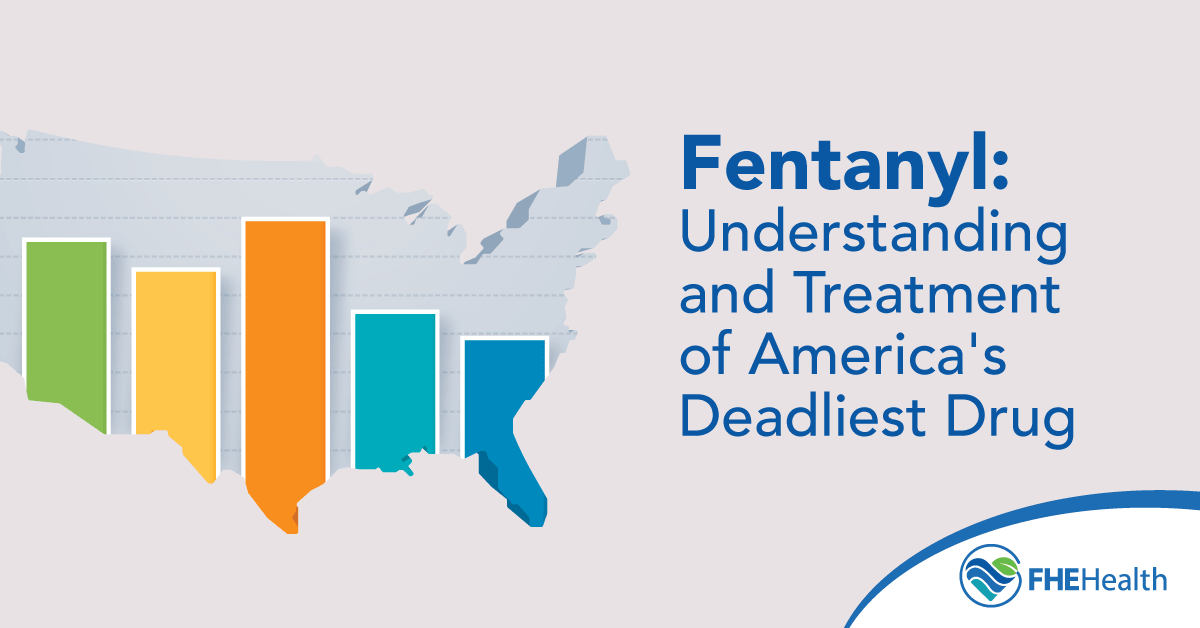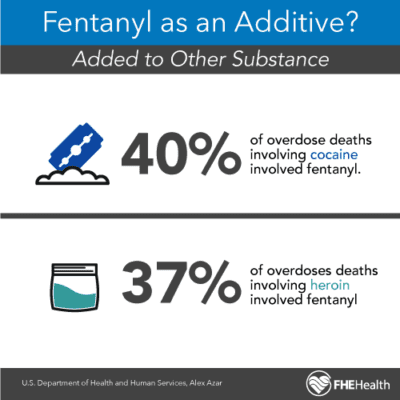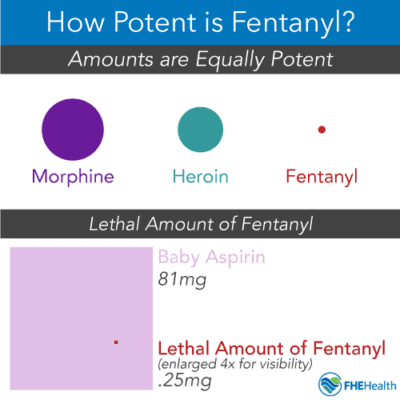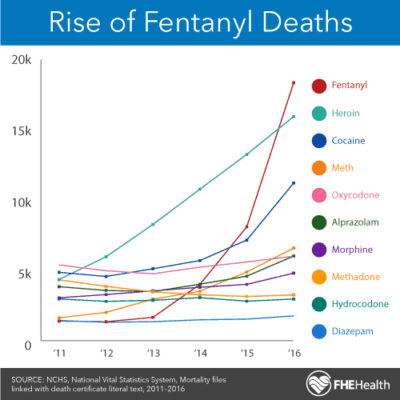
As America’s drug problem continues to evolve, more people are dying as a result of overdoses on one of a variety of opioids, both illicit and legally prescribed. The issue is that these drugs are as easy to access as they’ve ever been, and more dangerous varieties are also hitting unregulated markets by way of a number of different channels.
Data shows that the fentanyl epidemic is responsible for many of the opioid-related deaths across America. Although deaths involving fentanyl overdoses declined slightly in 2023 compared to the previous year, it still ranks as the deadliest drug in the United States. The CDC estimates that 74,202 people died after taking fentanyl in 2023. This figure significantly outstrips the estimated 36,251 psychostimulant-related deaths and 29,918 deaths involving cocaine.
In this article, we’ll discuss what fentanyl is, why it’s so dangerous, and why it’s important to seek treatment if you or a loved one is misusing fentanyl or any other opiate, whether it was legally prescribed or not.
America’s Deadliest Drug: What Is Fentanyl?
Fentanyl is a high-strength pain reliever given to patients who no longer respond to standard opioid analgesic medications. It’s been slowly being phased out of therapeutic use due to the fact that it’s much stronger than any other natural opiates, including morphine and heroin. Generally, doctors only prescribe fentanyl to treat breakthrough pain in people with cancer.
In recent years, fentanyl has been more commonly manufactured outside FDA-approved labs by street-level dealers and either sold as-is or mixed in with other drugs.
Why Is Fentanyl So Dangerous?
Although the slight decrease in synthetic opioid-related deaths may be an early sign that America’s war on fentanyl is working, its potency still qualifies it as the nation’s deadliest drug. The danger of fentanyl is twofold: The drug is becoming more widely available, and it’s much stronger than other opiates. This means using fentanyl by itself presents a higher risk of an overdose than using other opiates.
How Strong is Fentanyl, Really?
Fentanyl is one of the strongest opiates used in medical settings, and street varieties of this synthetic drug may be even stronger. For scale, medical fentanyl can be 50 to 100 times stronger than morphine, another powerful pain reliever offered to patients with severe pain, according to the National Institute on Drug Abuse. Heroin, which is an illegal opiate responsible for a high number of overdose deaths itself, can be around 50 times weaker than fentanyl.
How much fentanyl it takes to cause a fatal overdose depends on each person’s health status, weight and previous opioid use. The DEA estimates that a dose of around 2 milligrams can be fatal. Alarmingly, 42% of seized pills contain 2 milligrams or more, and some counterfeit fentanyl pills contain up to 5.1 milligrams of the drug.
Recently, there have been several reports of first responders experiencing overdoses after handling items contaminated with fentanyl. To avoid accidental exposure, first responders may wear gloves and other protective gear. However, you’re highly unlikely to absorb enough fentanyl from touching a contaminated object to make you unwell.
While it’s possible to absorb fentanyl through your skin, you’d have to experience extended contact over several hours or days before it caused significant health issues. Fentanyl patches, which deliver a constant dose of fentanyl through the skin, are a significant exception. Accidental overdoses due to contact with fentanyl patches are most common in children and can happen if they unwittingly stick them on their skin or put them in their mouths. If you use fentanyl patches, it’s essential to store them out of reach of children and dispose of them securely after use. Taping the patch to your skin and checking it throughout the day can reduce the risk of it falling off.
Part of a Deadly Mix
Fentanyl is also very cheap to produce, which poses an additional threat. Officials are finding fentanyl mixed into various forms of cocaine, both as a way to increase profit margins on the cocaine and as a new way of taking the drug. Whether the user knows their crack or powder cocaine contains a small amount of fentanyl or not, this increases the risk of overdose by a substantial margin.
In fact, determining whether drugs contain fentanyl is challenging because it doesn’t have a distinctive flavor or odor. Therefore, it’s relatively easy to take fentanyl accidentally if you use other illicit substances. To reduce the risk of harm, the CDC recommends testing all non-prescribed drugs with fentanyl test strips before consuming them.
Mixing fentanyl with other drugs is becoming a common reason for fatal overdoses. For example, 37% of overdoses in Washington State involved a synthetic opioid like fentanyl alongside methamphetamine in 2022. People who died from fentanyl overdoses were also more likely to have used cocaine or alcohol than those who experienced fatal heroin overdoses.
Lessons from the Data
These numbers are particularly shocking when it comes to the addiction treatment community. Fentanyl is the country’s deadliest drug threat because of its strength and how easy it is to consume accidentally. Therefore, it can kill before the user has a chance to recognize that they may need help. The important thing to note is that even when you think you have your drug use under control, there’s always the chance something could go wrong.
The best way to manage your addiction is with care and supervision by qualified professionals. If you or a loved one is struggling with addiction, it’s never too soon to seek treatment. For more information, contact FHE Health today.









